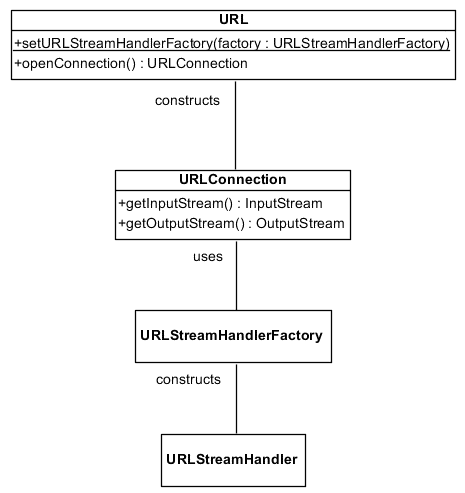|
Protocol Handlers
An Introduction with Examples in Java |
|
Prof. David Bernstein |
| Computer Science Department |
| bernstdh@jmu.edu |
|
Protocol Handlers
An Introduction with Examples in Java |
|
Prof. David Bernstein |
| Computer Science Department |
| bernstdh@jmu.edu |
url = new URL("sfp://"+sfpHost+":"+sfpPort+"/");
connection = (SFPConnection)(url.openConnection());
connection.connect();
in = (SFPInputStream)(connection.getInputStream());
out = (SFPOutputStream)(connection.getOutputStream());
// Useful code would go here
The Relevant Classes in Java

SFPConnection
import java.io.*;
import java.net.*;
import java.util.*;
/**
* A communications link with an SFP host
*
* @version 1.0
* @author Prof. David Bernstein, James Madison University
*/
public class SFPConnection extends URLConnection
{
private SFPSocket s;
public static final int DEFAULT_PORT = 5190;
public static final int SIGNON = 1;
public static final int DATA = 2;
protected static final byte[] sfpon =
{(byte)'S',(byte)'F',(byte)'P',(byte)'O',
(byte)'N',(byte)'\r',(byte)'\n',(byte)'\r',
(byte)'\n'};
/**
* Construct a new SFPConnection
*
* @param u The SFP URL of the host
*/
public SFPConnection(URL u)
{
super(u);
}
/**
* Connect with the SFP server
*/
public synchronized void connect() throws IOException
{
int port;
String host;
if (!connected)
{
port = url.getPort();
if (port < 0) port = DEFAULT_PORT;
host = url.getHost();
s = new SFPSocket(host, port);
connected = true;
}
}
/**
* Gets the content-type for this SFPConnection
*
*/
public String getContentType()
{
return "binary/sfp";
}
/**
* Get an InputStream for this SFPConnection
*
* Note: This function will connect first if necessary
*/
public synchronized InputStream getInputStream() throws IOException
{
if (!connected) connect();
return s.getInputStream();
}
/**
* Get an OutputStream for this SFPConnection
*
* Note: This function will connect first if necessary
*/
public synchronized OutputStream getOutputStream() throws IOException
{
if (!connected) connect();
return s.getOutputStream();
}
}
SFPStreamHandler
import java.io.*;
import java.net.*;
import java.util.*;
/**
* A stream protocol handler for the SFP protocol
*
*
* @version 1.0
* @author Prof. David Bernstein, James madison University
*/
public class SFPStreamHandler extends URLStreamHandler
{
/**
* Opens a connection to an SFP host
*
* @param u The URL of the SFP host (sfp://host:port/)
*
*/
protected URLConnection openConnection(URL u) throws IOException
{
return new SFPConnection(u);
}
/**
* Parses an SFP URL
*
* @param u The URL to fill
* @param spec The String representation of the URL to parse
* @param start The character index at which parsing should start
* @param limit The character index at which parsing should stop
*
*/
protected void parseURL(URL u, String spec, int start, int limit)
{
int port;
String file, host, protocol, ref;
StringTokenizer st;
st = new StringTokenizer(spec.substring(start,limit), "/:");
protocol = null;
host = null;
file = null;
ref = null;
port = SFPConnection.DEFAULT_PORT;
try
{
if (start == 0) protocol = st.nextToken().toLowerCase(); // sfp
host = st.nextToken();
port = Integer.parseInt(st.nextToken());
}
catch (Exception e)
{
// Use the default values
}
setURL(u, protocol, host, port, file, ref);
}
/**
* Converts an SFP URL to a String
*
* @param u The URL to convert
* @return A String representation of the SFP URL
*
*/
protected String toExternalForm(URL u)
{
return "sfp://"+u.getHost()+":"+u.getPort();
}
}
SFPStreamHandlerFactory
import java.net.*;
/**
* Creates SFPStreamHandler objects
*
* Note: This is a very simple factory. For example, it does not attempt
* to re-use SFPStreamHandler objects that have been disposed of.
*
* @version 1.0
* @author Prof. David Bernstein, James Madison University
*/
public class SFPStreamHandlerFactory implements URLStreamHandlerFactory
{
/**
* Create an appropriate URLStreamHandler
*
* @param protocol The protocol to use
* @return The URLStreamHandler
*/
public URLStreamHandler createURLStreamHandler(String protocol)
{
if (protocol.equalsIgnoreCase("sfp")) return (new SFPStreamHandler());
else return null;
}
}
URL Class the Kind of Connection to Create URL.setURLStreamHandlerFactory(new SFPStreamHandlerFactory());
url = new URL("sfp://"+sfpHost+":"+sfpPort+"/");
connection = (SFPConnection)(url.openConnection());
connection.connect();
in = (SFPInputStream)(connection.getInputStream());
out = (SFPOutputStream)(connection.getOutputStream());
// Useful code would go here
URL was parameterized (so we could specify the
type of URLConnection)URLConnection was parameterized (so we could specify
the type of InputStream and
OutputStream)